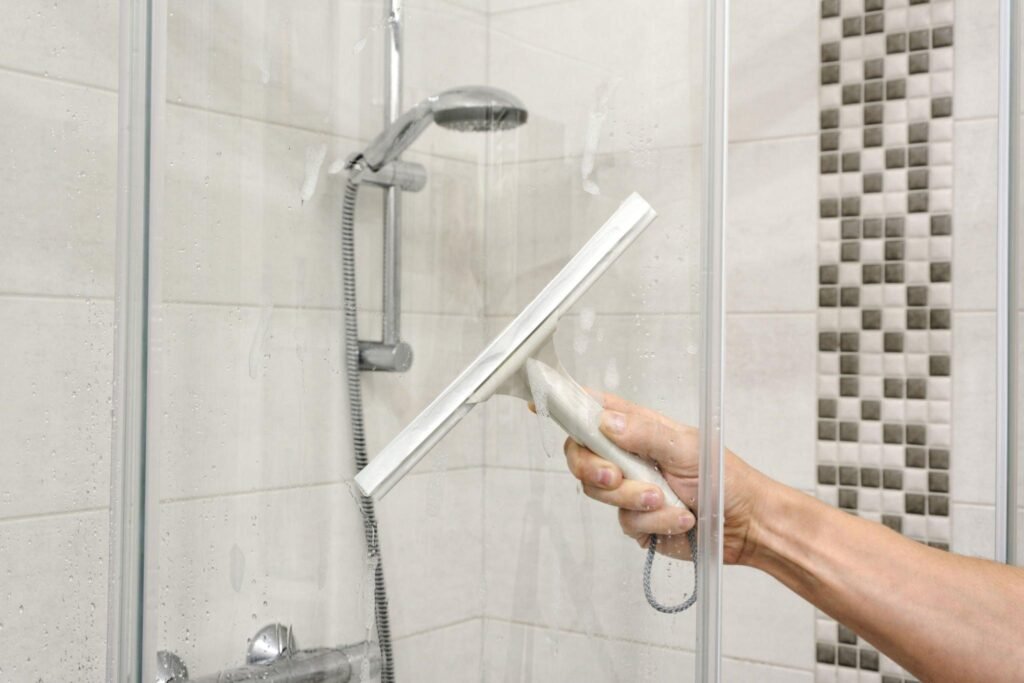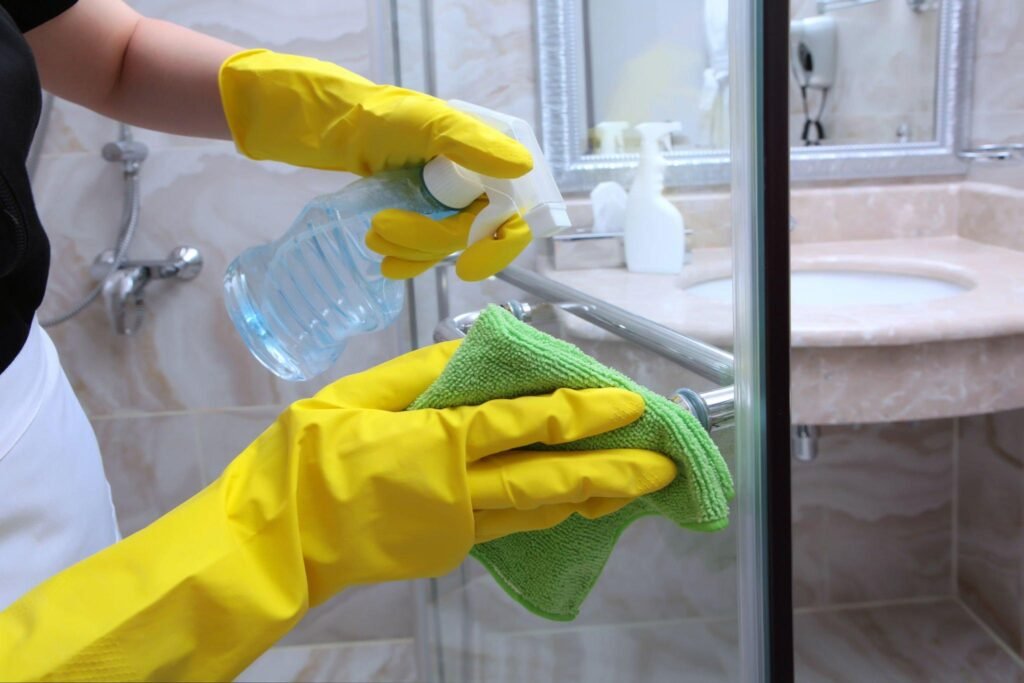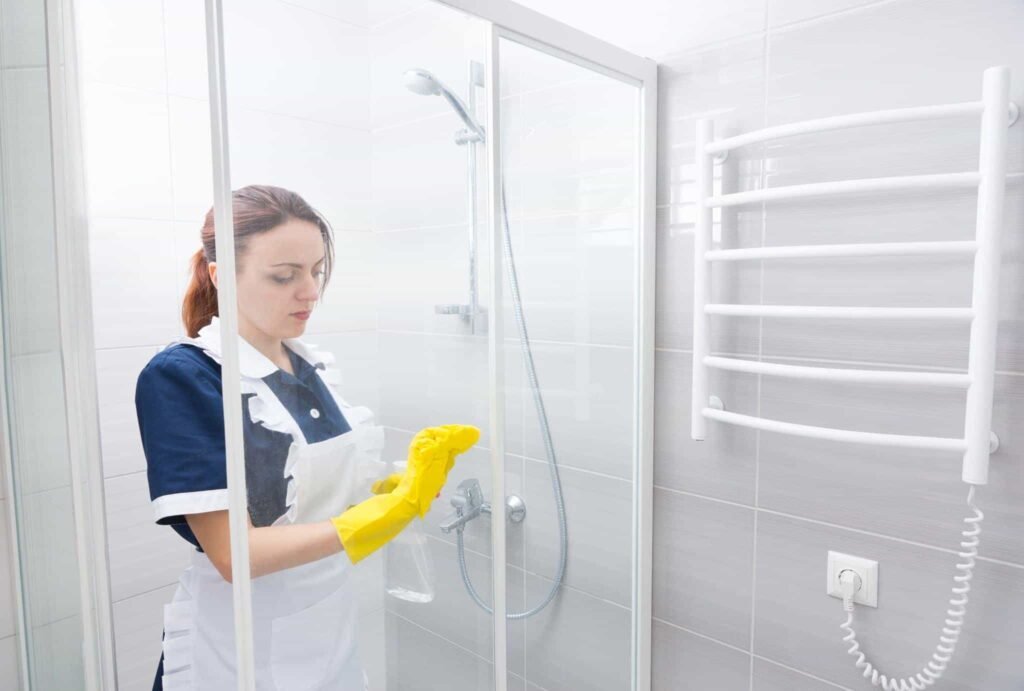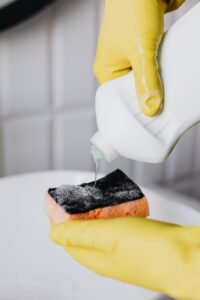Glass shower doors can add a touch of elegance to any bathroom, but over time, hard water stains can build up and diminish their beauty. Hard water contains minerals like calcium and magnesium that can leave unsightly stains on glass surfaces. If you’re wondering how to clean glass shower doors to their original sparkle, we’ve got you covered. In this blog post, we will provide you with effective methods to clean hard water stains from glass shower doors and make them look as good as new.
What is Hard Water?
Hard water contains a large number of dissolved minerals. It contains these minerals because, on the water’s journey through the ground and into our water systems, it picks up minerals such as chalk, lime, calcium, and magnesium along the way.
Although hard water is not a health hazard and is generally safe to drink, being exposed to hard water over a long amount of time can wreak havoc on both your appliances and your skin, especially if you suffer from skin conditions like eczema.
What Causes Shower Doors and Screens to Get Hard Water Stains?
Even though you routinely use bathroom cleaning solutions and wipe the shower units down, if you’ve ever had a new glass shower door or screen installed, you can probably relate to the fact that the glossy and new appearance does not last as long as you’d anticipated.
Because there are other issues at play in this situation as well, it might be difficult to remove hard water stains from shower doors. It’s soap scum, a concoction of oil and hard water.
Cleaning glass shower doors with hard water stains can be a bit challenging, but here’s a step-by-step guide to help you get rid of those stains:
Gather the Necessary Supplies
- Before you begin cleaning, make sure you have the following items on hand:
- Distilled white vinegar
- Baking soda
- Lemon juice
- Microfiber cloth or sponge
- Spray bottle
- Plastic scrubber or non-abrasive sponge
- Water

The Process of Cleaning
As this is such a common problem that so many people face, the internet proposes many supposed solutions that have been tried and tested by shower scrubbers around the globe, although many of these are often to no avail.
Preparing the Cleaning Solution
1- Vinegar Solution
Mix equal parts of distilled white vinegar and water in a spray bottle.
2- Baking Soda Paste
Create a paste by combining baking soda with a small amount of water or lemon juice until it forms a thick consistency.
3- Let the Solution Sit
Allow the vinegar solution or baking soda paste to sit on the glass for approximately 10 to 15 minutes. This will give the solution enough time to penetrate the stains and loosen them.
4- Scrubbing
Gently rub the glass shower doors in circular motions with a plastic scrubber or non-abrasive sponge. Concentrate on the spots that have hard water stains and, if necessary, exert a little extra pressure. The mineral deposits will be easier to remove by being broken down by vinegar or baking soda.
5- Rinse and Wipe
Rinse the glass doors well with warm water to get rid of any leftover cleaner. Then, remove the loose stains using a microfiber cloth or sponge. Make sure to properly dry the glass to avoid the development of freshwater spots.
Note:
Repetition may be required if the hard water stains are particularly difficult to remove. Be persistent and patient, as it could take several tries to thoroughly remove some stains.
6- Try Using Professional Cleaners
There are several cleansers available that are made for the purpose of removing hard water stains. When using these cleansers, ensure appropriate ventilation and adhere to the product’s recommendations.
Take into account the following precautions to maintain the appearance of your glass shower doors:
- After each shower, remove extra water with a squeegee or a microfiber towel.
- To lower the mineral content of the water, install a water softener or showerhead filter.
- Use a gentle glass cleaner to routinely clean the glass doors to avoid the accumulation of mineral deposits.
Use a gentle glass cleaner to routinely clean the glass doors to avoid the accumulation of mineral deposits.

Clean Shower Door
Maintaining a spotless and hygienic bathroom requires routine shower door cleaning. Start by gathering the necessary tools: a spray bottle, white vinegar, water, a microfiber cloth or sponge, a squeegee, and a towel in order to do this task successfully. In the spray bottle, combine white vinegar and water in equal parts to create a cleaning solution. Vinegar’s acidic qualities make it a great option for eliminating mineral deposits and soap scum from the door. When the solution is prepared, liberally spray it onto the shower door, being sure to cover every inch. Allowing the vinegar mixture to settle for a while can help dislodge any tenacious dirt.
After that, scrub the door with a microfiber cloth or sponge, paying close care to the corners and edges. Use a squeegee to remove extra moisture as a finishing touch to provide a streak- and spot-free finish. To avoid water stains, dry the door with a fresh towel before closing it. These procedures can help you restore the shine and cleanliness of your shower door, making showering a revitalizing and pleasant experience.
Conclusion
You can restore the attractiveness of your glass shower doors and get rid of hard water stains with the appropriate cleaning methods and little work. Always pick a cleaning technique that works with the supplies you have on hand and your tastes. cleaning glass shower doors with hard water stains requires a combination of effective techniques and regular maintenance. Hard water stains can be stubborn and difficult to remove, but with the right approach, you can restore the clarity and shine of your shower doors.
Always test cleaning solutions on a small, inconspicuous area of the glass shower doors before applying them to the entire surface to ensure they do not cause any damage.
See Also How Often to Clean Dryer Vent: The Ultimate Maintenance Guide





